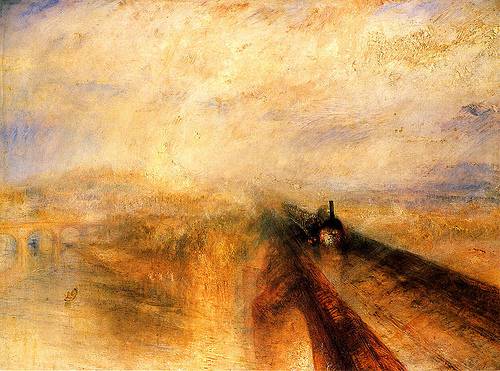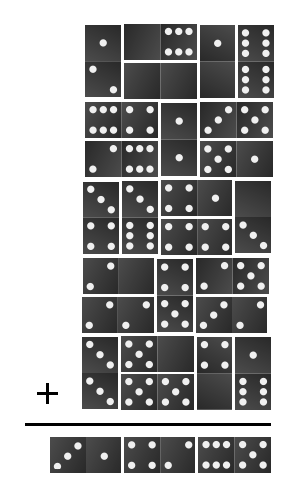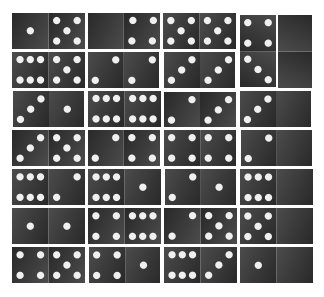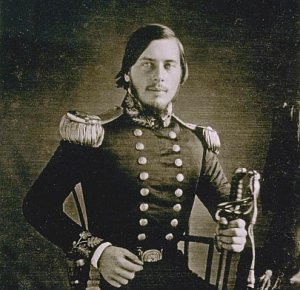knickknackatory
n. a collection of knickknacks
A tongue twister: Bluebeard brought back black bric-a-brac.
knickknackatory
n. a collection of knickknacks
A tongue twister: Bluebeard brought back black bric-a-brac.

In 1842, a Mrs. Simon was traveling by train through the English countryside when a torrential downpour began. The kind-looking elderly gentleman sitting opposite her suddenly arose, opened the window, put his head out, and kept it out for nearly nine minutes. Finally he withdrew it, dripping with water, closed the window, and sat with his eyes closed for a quarter of an hour.
Unable to suppress her curiosity, the young lady arose, opened the window, and put her own head out.
At the next year’s Academy, as she was viewing Rain, Steam, and Speed, someone behind her said, “Just like Turner, ain’t it. Whoever saw such a ridiculous conglomeration?”
She said quietly, “I did.”
A set of dominoes can be arranged into a valid arithmetic sum:

and into a magic square:

From Joseph S. Madachy, Madachy’s Mathematical Recreations, 1966, and W.W. Rouse Ball, Mathematical Recreations and Essays, 1919.
As he was visiting his parishioners one Saturday afternoon, a new pastor stopped at one house and found that no one answered the door. It was clear that someone was home, but he knocked repeatedly and no one appeared. Finally he pulled out his card, wrote “Revelation 3:20” on the back, and left it in the door.
That Sunday he found the card in the collection basket. Below his message someone had written “Genesis 3:10.”
Revelation 3:20 reads, “Behold I stand at the door, and knock: if any man hear my voice, and open the door, I will come in to him, and will dine with him, and he with me.”
Genesis 3:10 reads, “And he said, I heard thy voice in the garden, and I was afraid, because I was naked.”
What is shorter when it is longer and longer when it is shorter; also bigger when it is smaller and smaller when it is bigger?
A word. LONGER is shorter than SHORTER, and SMALLER is bigger than BIGGER.
Richard Lederer and Gary Hallock devised this puzzling sentence, which is best read aloud:
What is a four-letter word for a three-letter word which has five letters yet is still spelled with three letters, while it has only two and rarely has six and never is spelled with five?
It’s not a question, but a statement. Capitalize WHAT, FOR, WHICH, YET, IT, RARELY, and NEVER.

When he was a cadet at West Point, California humorist George Derby had attended a class on military strategy.
“A thousand men are besieging a fortress that contains these quantities of equipment and provisions,” said the instructor, pointing to a chart. “It is a military axiom that at the end of 45 days the fort will surrender. If you were in command of this fortress, what would you do?”
Derby raised his hand and said, “I would march out, let the enemy in, and at the end of 45 days I would change places with him.”
I fire two shots and kill Cristabel. The first bullet strikes her brain, killing her immediately. The second bullet lodges in her heart: it would have killed her, had she not already died because of the first bullet. I argue that I did no serious harm. Bearing in mind what the second bullet would have done, the first bullet merely caused Cristabel the loss of one second of life — hardly serious. The second bullet, of course, did not kill her.
— Peter Cave, This Sentence Is False, 2009
At Frank Sinatra’s funeral, friends and family members were invited to place items of personal significance into his coffin. Reportedly these included:
Why 10 dimes? “He never wanted to get caught not able to make a phone call,” his daughter Tina told Larry King.

Halle Berry was named after a department store.
“My mother was shopping in Halle Brothers in Cleveland,” she told the New York Daily News. “She saw the bags and thought, ‘That’s what I’m going to name my child.'”
(By the way: “No one ever says it right. It’s Halle, like Sally.”)